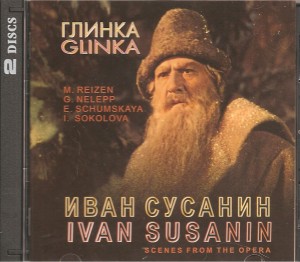Ivan Susanin (A Life for the Tsar) is perhaps Glinka’s masterpiece. This two-CD set contains excerpts from the greatest recording of the opera, made in 1951. It also contains two of Ivan’s great scenes from the film made in 1942. Aquarius has been releasing collections of great Soviet singers as well as thrillingly sung performances of standard repertoire from the 1950s. Although much of the material has circulated before on LP, Soviet recording was notorious for its ghastly sound. Melodiya evidently recorded in a sauna; soloists seemed to be screaming and orchestras were invariably too distant. Surfaces were disastrous and pitch was unreliable. But what was released to the masses and selectively exported was recorded one way, while the elite got tapes of the performances that sounded as good as or better than any recordings being made at the time anywhere. (The Soviets had seized tape recorders and blank tape left behind by the retreating Nazi army, and for a time had a real advantage in sound recording.)
On this pressing, woodwinds, harps, and delicate percussion all sound clearly in a natural balance; the marvelous string playing is enveloping physically but not at the cost of Glinka’s vivid and varied orchestral palette. And there are no dips or leaps in recording pitch. It’s a revelation.
And the performers! Mark Reizen was one of the greatest basses of the 20th century: he had a magnificent rolling black tone over a large range, endless breath, a huge dynamic range, and such vivid words that even non-Russian speakers have a powerful sense of what he is singing. His voice lasted his entire life; there is amazing film of his singing (gloriously) onstage at the Bolshoi at the age of 90—in 1985. Here he is just astounding, both in what was recorded and on the film excerpts.
The soprano, Elizabeta Shumskaya, a Soviet favorite, sounds hard on the LPs. Here her voice rings out gorgeously and with tremendous expression. The mezzo, Irina Sokolova, has a wonderful, enveloping tone and enormous spirit, and the major spinto tenor of the Soviet era, Georgy Nelepp, has sweetness as well as heft and ring at his command (on his many LPs he seems to be screaming a lot). He gets the short end of the stick in the excerpts chosen, though the “complete” LP is heavily cut and he didn’t record his insanely high aria.
As an encore we get six Russian songs, most not familiar outside specialist circles, and all fantastically sung by Reizen. The conductor, Vassily Nebolsin, was one of those maniacs who flourished in the Soviet era, at least until someone they had screamed at informed on them. But his “seat of the pants” inspirational style is thrilling, very well controlled, and his touch-ups to Glinka’s orchestration do no harm. The choral singing has miraculous beauty, richness, and control.
Aquarius apparently has gotten access to a lot of material from this era, and we can hope that they continue their releases. Here’s longing for a complete issue of the insane but thrilling Golovanov symphonic recordings.
































